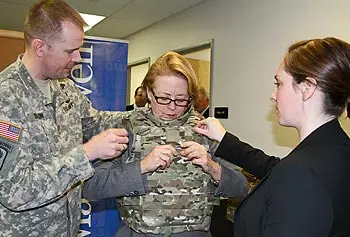Collaboration Will Help Develop Better Body Armor, Clothing, Equipment

02/19/2013
By Edwin L. Aguirre
Imagine designing better parachutes by understanding how air flows through fabrics; protecting soldiers by developing flame- and heat-resistant clothing made from renewable, environmentally friendly raw materials; providing portable, lightweight power sources in the field using nanomaterials-based solar cells and making meal rations last longer and easier to prepare for troops on the move.
These are just some of the collaborative projects that researchers from UMass Lowell and their counterparts from the U.S. Army’s Natick Soldier Research, Development and Engineering Center (NSRDEC), known locally as Natick Labs, will be working on as part of a new research and development initiative.
Called HEROES — Harnessing Emerging Research Opportunities to Empower Soldiers — the effort aims to enhance military members’ survivability, sustainability, mobility, combat effectiveness and quality of life in the field.
The partnership was formally launched Feb. 7 at an event at UMass Lowell. Speakers included U.S. Rep. Niki Tsongas, Lt. Gov. Tim Murray, Chancellor Marty Meehan, NSRDEC Director Jack Obusek, UMass President Robert Caret and 1st Sgt. Brian Gemmill, a Natick Labs employee who has served combat tours in both Iraq and Afghanistan.
“HEROES will bring the vast expertise and resources of the U.S. Army and UMass Lowell to bear on life-or-death issues faced by our military personnel every day around the world,” said Meehan. “Through this joint mission, our top-notch researchers will help keep our armed forces safe, mobile and comfortable as they fulfill their missions. The initiative will also allow our students to apply what they are learning at UMass Lowell to real-world situations of great importance.”
“HEROES will result in the development of new technologies and new thinking about ways to provide cutting-edge capabilities to our soldiers. The collaboration is a testament to the great value the Army places on our being located in Massachusetts and takes our partnership with UMass Lowell to a new level. As a former soldier and father of a soldier, I am grateful to be able to tap into the ideas of the best and brightest the Commonwealth has to offer, and turn those ideas into reality for soldiers,” Obusek told the audience.
Spearheading the initiative are Natick Labs Chief Scientist Lynne Samuelson ’90, who earned her Ph.D. at UMass Lowell and is an adjunct faculty member; (https://www.uml.edu/experts/Featured/Julie-Chen.aspx) Julie Chen, UMass Lowell’s vice provost for research; and Plastics Engineering Assoc. Prof. Ramaswamy Nagarajan. Through HEROES, the partners will work together to secure research funding.
A Shared Vision
The joint research will be conducted both at Olney Hall on North Campus and at Natick Labs. HEROES’ 5,000-square-foot campus space includes laboratories, offices, conference rooms and a “think tank” area where researchers will work side-by-side, brainstorming new ideas. The initiative will also benefit from access to state-of-the-art equipment at UMass Lowell’s new, $80 million Mark and Elisia Saab Emerging Technologies and Innovation Center, as well as the wide range of expertise provided by University faculty and student researchers, including the fields of nanomanufacturing, plastics engineering, mechanical engineering, electrical engineering, physics and chemistry.
Meanwhile, unique Natick facilities such as the Doriot Climatic Chambers will be made available to UMass Lowell researchers. The chambers can simulate virtually every climate or environmental conditions in the world to test the performance of humans, materials and equipment.
“The research and development that will happen in these labs will result in benefits not just to our troops in the field but also to companies in the region, as they commercialize the resulting new products and technologies,” said Chen.
